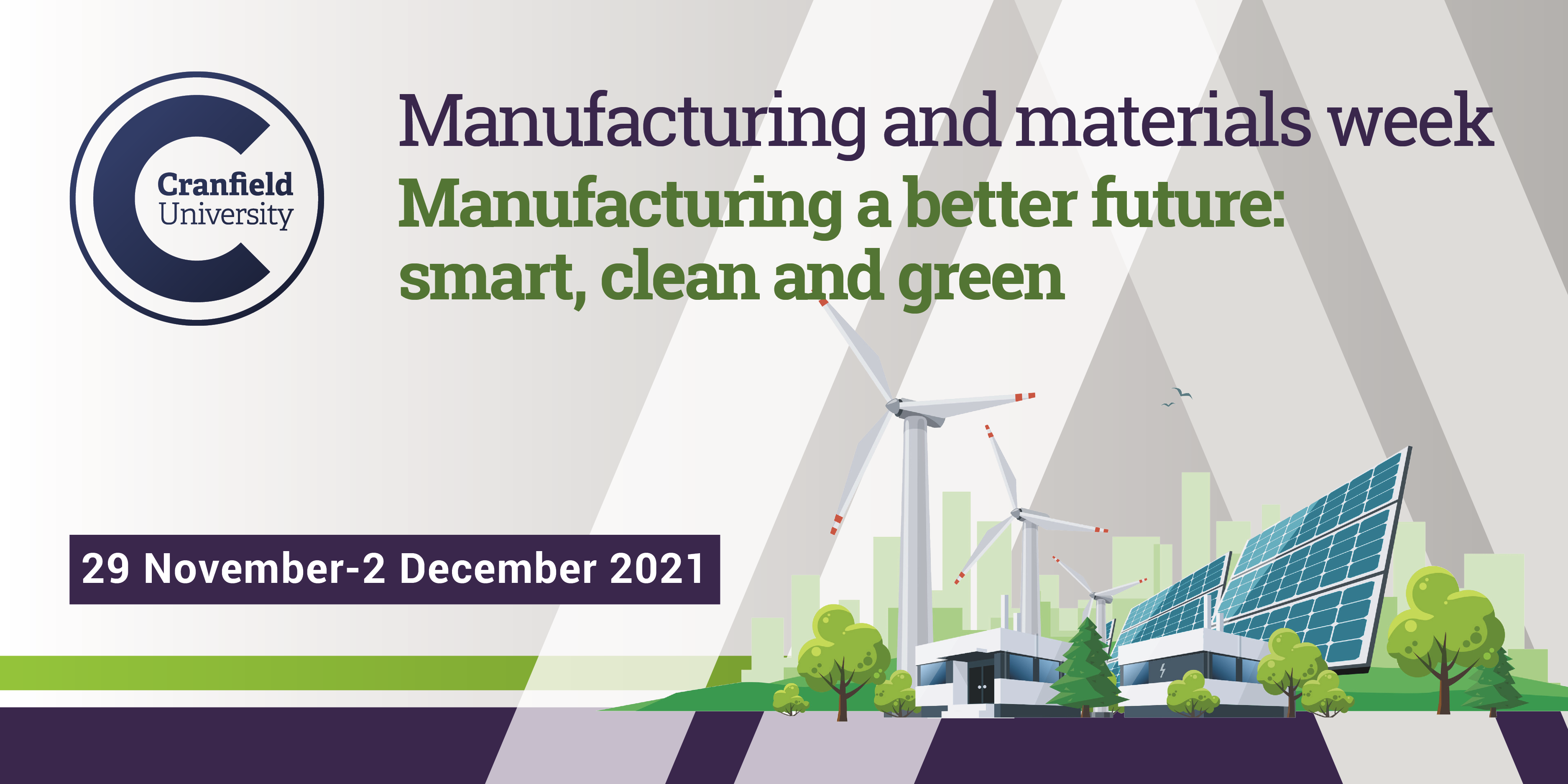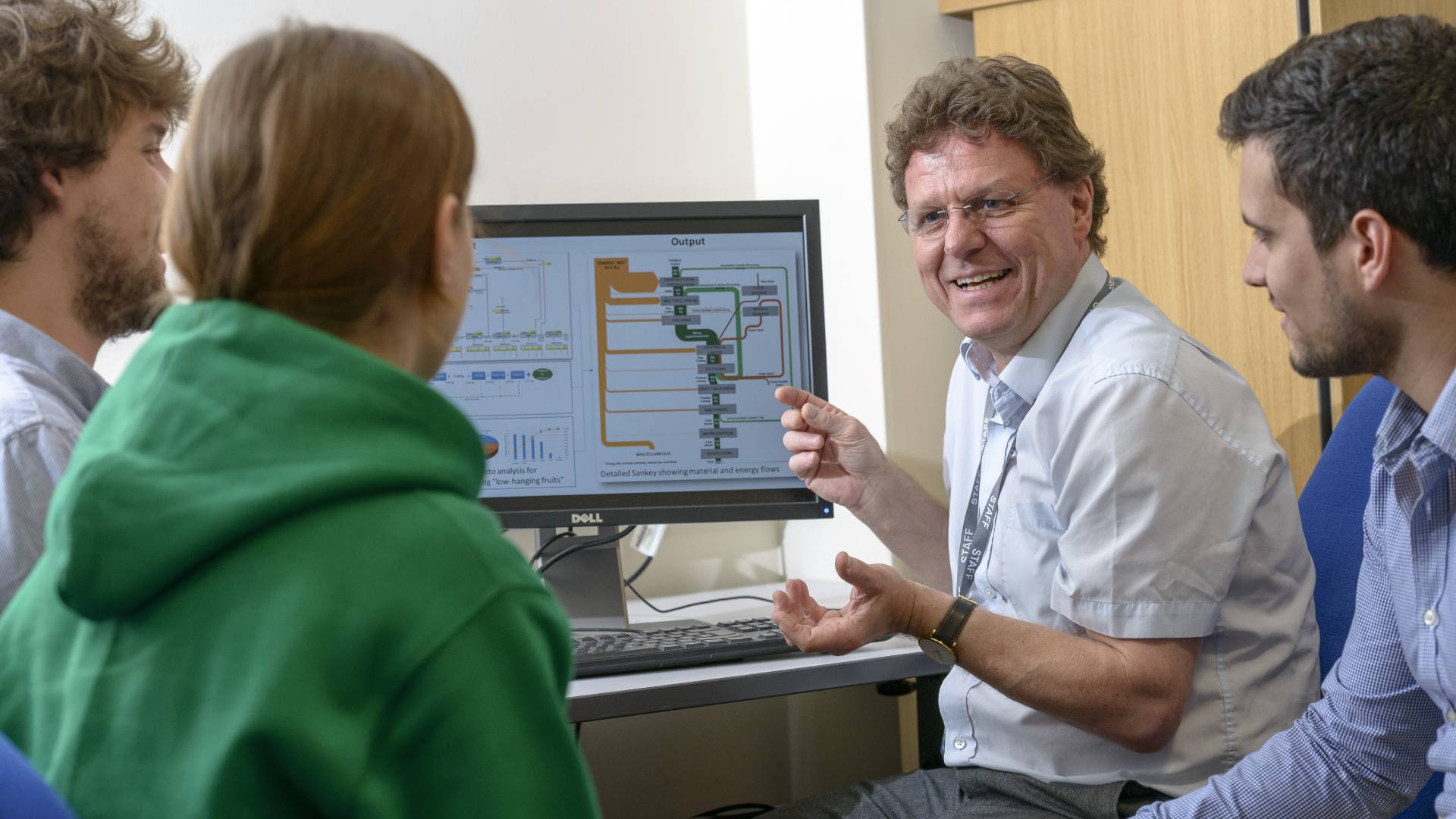Welcome to Manufacturing and materials week 2021
07/10/2021

Following the success of last year’s virtual Manufacturing and materials week in December 2020, Cranfield University is excited to announce their Manufacturing and materials week 2021 will take place Monday 29 November to Thursday 2 December 2021.
Following the announcement that Cranfield will lead the Government’s new Transforming Foundation Industries Research and Innovation Hub (TransFIRe), the Hub’s lead and the University’s Director of Manufacturing, Professor Mark Jolly, reflects on the exciting times – as well as the challenges – ahead for UK manufacturing.
Cranfield has been selected to lead the £4.7m research consortium, examining how the foundation industries can grow and develop while helping achieve the net zero 2050 environmental targets.
TransFIRe was developed in response to the Industrial Strategy Challenge Fund (ISCF) call to transform the foundation industries: chemicals, cement, ceramics, glass, metals and paper.
Mark explains: “These industries produce 75% of all materials in the UK economy and are vital for the UK’s manufacturing and construction industries, but there is so much more we can do to help them grow and develop into cleaner and more sustainable businesses. With progress in AI and digital manufacturing this is a real opportunity to transform these industries with the help of new technologies.
For too long, the foundation industries have been dismissed as too difficult to clean, too difficult to modernise and too difficult to diversify. TransFIRe shows that the commitment is there from academia, industry and Government to take on those challenges and transform the foundation industries that have for generations played such a vital role in the UK economy.
Wasted energy is one area which we will focus on. For example for every tonne of metal that is melted and then solidified, whether it’s steel iron or aluminium, about one gigajoule of energy is released. For years this has been fired back into the atmosphere, contributing to some of the environmental issues we see today, but now we are finding ways of capturing this low grade heat.
This has already been demonstrated in Sweden, where the heat from foundries is being redeployed into district heating systems. And we have the opportunity to do the same in the UK. We all know Scunthorpe’s four queens: the steelworks’ four blast furnaces named after Queens Victoria, Anne, Mary and Bess are still standing and serviceable. Set on a huge brownfield site in the North East, if we could harness the energy from the furnaces for wider community use – whether powering greenhouses for market gardening, district heating and more think of the impact that could have. These large sites with abundant space available could be perfect to harness the low-grade heat being emitted – here it’s not even necessary to convert the heat, simply to capture it. Working with local communities to capture this energy has fundamental societal and environmental benefits – the very notion of true sustainability.”
Changing the processes
The whole programme for TransFIRE is about looking at best practice and what common processes can be transferred between the industries, for example the transportation of material, emissions, and how we utilise by products.
Car manufacturer, Toyota, coined the term, Gentani – the real minimum resource that you need to carry out a process. Take ceramics for example, we are now looking at the chemistry to see if we can use cold-sintering techniques to join the particles together at a lower temperature. The lower the temperature, the less energy is used. Novel processes, like cold sintering, could be applied to other materials, lowering the resources required to deliver the same results.
Where there’s muck there’s brass
We need to stop seeing by-products as waste. How can we use these by-products in other industries to create new materials and processes? From blast furnace waste products used in the cement industry, to the paper industry’s use ceramic fillers, this is essentially changing the business models over the whole supply chain. Looking closely at the CO2 footprint throughout the process, we can identify where we can make the processes more symbiotic, integrated and working in support of one another.
Applying our knowledge and expertise
TransFIRe is a consortium of 20 researchers from 12 institutions, 49 companies and 14 non-governmental organisations, with expertise across the foundation industries. It brings together materials focused universities, with social and computer scientists, and business specialists. Expertise also covers energy mapping, life cycle and sustainability, industrial symbiosis, AI and digital manufacturing, and technology transfer.
By developing a self-sustaining hub of expertise to support the foundation industries’ transformation into non-polluting, resource-efficient, modern, competitive businesses, we want to work in harmony with the communities in which they are situated, providing attractive places to be employed with unparalleled equality, diversity and inclusion performance.
Challenging stereotypes
It’s not simply about transforming processes, it’s also about changing mindsets. The age of the burly macho engineer is long gone; health and safety regulations have made sure of that. This opens up huge opportunities for many more people in the manufacturing industry – the greater need for communications and IT skills, for example, is transforming the workforce. A great example of this at glass manufacturer, Encirc360, is their Women with Bottle programme. Fostering and promoting a culture of equality, diversity and inclusivity (EDI) was key to the company, focusing on boosting gender equality across the business and supporting women through their careers.
Tackling global issues – the green recovery
Mark is excited about what the Manufacturing and materials week event has become and how the work and expertise of TransFIRE will be pivotal this year.
The headline events of the week will be the National Manufacturing Debate, now in its 12th year. This will focus on the green recovery, with Manufacturing 2075 considering the space industry. The TransFIRE programme spans both of these, with sessions on EDI, AI and what future skills are going to be needed by the industry to keep pushing towards the net zero goal from members of the consortium already planned throughout what promises to be a busy and productive week.
Cranfield’s 2021 Manufacturing and materials week will bring together industry professionals from all over the world to celebrate manufacturing and look ahead at the industry’s role in a post-Covid world. This is a must-attend event for anyone – students, professionals, innovators – with an interest in the future of the manufacturing industry.
For more information and to register for free visit: www.cranfield.ac.uk/manufacturingweek

Categories & Tags:
Leave a comment on this post:
You might also like…
Keren Tuv: My Cranfield experience studying Renewable Energy
Hello, my name is Keren, I am from London, UK, and I am studying Renewable Energy MSc. My journey to discovering Cranfield University began when I first decided to return to academia to pursue ...
3D Metal Manufacturing in space: A look into the future
David Rico Sierra, Research Fellow in Additive Manufacturing, was recently involved in an exciting project to manufacture parts using 3D printers in space. Here he reflects on his time working with Airbus in Toulouse… ...
A Legacy of Courage: From India to Britain, Three Generations Find Their Home
My story begins with my grandfather, who plucked up the courage to travel aboard at the age of 22 and start a new life in the UK. I don’t think he would have thought that ...
Cranfield to JLR: mastering mechatronics for a dream career
My name is Jerin Tom, and in 2023 I graduated from Cranfield with an MSc in Automotive Mechatronics. Originally from India, I've always been fascinated by the world of automobiles. Why Cranfield and the ...
Bringing the vision of advanced air mobility closer to reality
Experts at Cranfield University led by Professor Antonios Tsourdos, Head of the Autonomous and Cyber-Physical Systems Centre, are part of the Air Mobility Ecosystem Consortium (AMEC), which aims to demonstrate the commercial and operational ...
Using grey literature in your research: A short guide
As you research and write your thesis, you might come across, or be looking for, ‘grey literature’. This is quite simply material that is either unpublished, or published but not in a commercial form. Types ...






